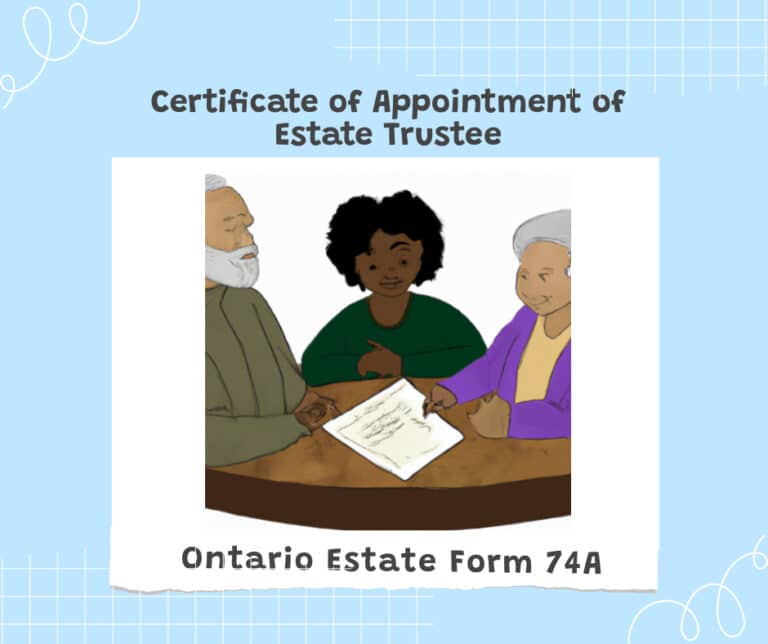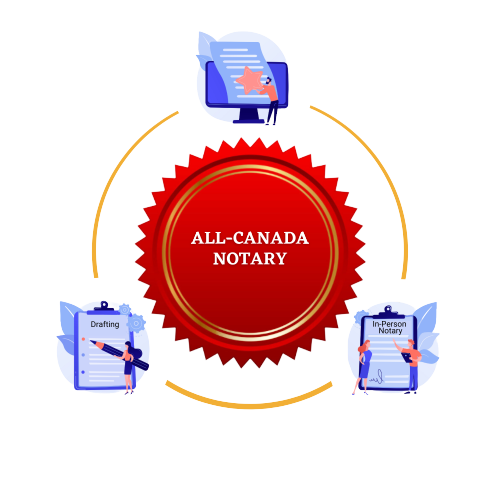When navigating the complexities of administering an estate in Ontario, understanding the Application for a Certificate of Appointment of Estate Trustee – Ontario Estate Form 74A is crucial. We can help you notarize required affidavits, for example, the Form 74D Affidavit of Execution or Form 74E Affidavit of Condition

What is a Certificate of Appointment of Estate Trustee – Ontario Estate Form 74A?
Form 74A, officially known as “Application for a Certificate of Appointment of Estate Trustee with a Will,” is the document you need to complete to apply for legal authority to manage a deceased person’s estate in Ontario when there is a valid will.
How long does it take to get a certificate of appointment of estate trustee in Ontario?
The processing time can vary, but on average, it takes around six to eight weeks to receive a certificate of appointment. However, this timeframe may extend if the application is complex or if there are issues that need to be resolved.
How do I get a certificate of appointment of an estate trustee without a will in Ontario?
If there is no valid will (intestate), you will need to apply for a “Certificate of Appointment of Estate Trustee without a Will” using Form 74. The process is somewhat different from applying with a will.
What is an appointment of estate trustee with a will?
An appointment of estate trustee with a will is a legal document issued by the court that grants authority to the named executor in a will to administer the deceased person’s estate according to the terms outlined in the will.
What is probate?
Probate is the court process that validates a will and confirms the appointment of the estate trustee. It ensures the will is legally binding and provides the executor with the authority to distribute the estate’s assets.
Is a lawyer required for probate in Ontario?
No, hiring a lawyer is not mandatory for the probate process in Ontario. However, due to the legal complexities involved, many individuals choose to seek legal counsel to ensure that the process is carried out correctly and efficiently.
What is the difference between the Small Estate Court process and the regular court process?
The Small Estate Court process is available for estates with a total value of $150,000 or less. It’s a simplified and quicker process that may not require a full probate application. Regular court processes are for larger estates. You should use the Small Estate Court process when the estate meets the criteria to save time and costs.
Where can I get Form 74A?
You can obtain Form 74A, along with other necessary forms and instructions, from the Ontario Court Forms website, which is accessible online here. Alternatively, you can visit your local courthouse to obtain a hard copy.
Are there any fees associated with applying for a certificate of appointment of estate trustee in Ontario?
Yes, there are fees associated with the probate process, and they are calculated based on the estate’s value. Be sure to check the current fee schedule on the Ontario Court Forms website to determine the exact amount.
What are the responsibilities of an estate trustee once appointed?
The estate trustee has several important responsibilities, including identifying and valuing the deceased’s assets, paying debts and taxes, distributing assets to beneficiaries as outlined in the will (or according to intestacy rules), and keeping detailed records of all transactions related to the estate.
Is an estate trustee the same as an executor in Ontario?
The terms “estate trustee” and “executor” are often used interchangeably. Both refer to the person who is appointed to manage and administer the estate of a deceased individual. The individual who is named as the executor in a valid will is typically referred to as the “executor.” However, when discussing estate administration more broadly or when there is no will, the term “estate trustee” is often used to describe the person responsible for handling the estate’s affairs.
Is power of attorney the same as estate trustee?
No, a power of attorney and an estate trustee in Ontario are not the same, and they serve different roles and functions in the context of estate planning and administration.
Power of attorney (POA) gives a person or group of people the legal authority to make decisions on behalf of another person, whereas a trustee has the legal responsibility to manage and administer a trust
Who Cannot be an estate trustee in Ontario?
There are certain individuals who are disqualified from acting as an estate trustee (executor). The following are common reasons why someone may not be eligible to serve as an estate trustee:
- Age Restriction: A person must be at least 18 years old to serve as an estate trustee in Ontario. Minors are not eligible.
- Incapacity: Individuals who lack the mental capacity to manage the estate’s affairs are not qualified to be estate trustees.
- Criminal Convictions: If a person has been convicted of certain criminal offenses, particularly those involving fraud, dishonesty, or a breach of trust, they may be disqualified from acting as an estate trustee.
- Bankruptcy: If an individual is declared bankrupt, they may be ineligible to serve as an estate trustee unless they have obtained a court order allowing them to do so.
- Conflict of Interest: Someone who has a conflict of interest with the estate or its beneficiaries may not be suitable to act as an estate trustee. For example, if they stand to gain financially from the estate in a way that could compromise their impartiality, it may disqualify them.
- Non-Residents: Non-residents of Canada may face restrictions or additional requirements when serving as estate trustees. They may need to post a bond or obtain special permission from the court.
- Unfit or Unwilling: Even if none of the above disqualifications apply, the court can still refuse to appoint someone as an estate trustee if it believes they are unfit or unwilling to carry out the duties responsibly and ethically.
How long does an executor have to settle an estate in Ontario?
There is no fixed timeframe mandated by law for an executor to settle an estate. The timeline can vary widely depending on the complexity of the estate, the presence of any disputes or challenges, and other factors. The executor is responsible for distributing funds as soon as possible. Therefore, it is common for executors to distribute funds among the beneficiaries to take up to 1 (One) year.
How can we help you?
As an estate trustee named in a will you have to file your probate application with the Estate Registrar at the Superior Court of Justice in the area where the person lived or owned real property. As a part of the application, you need to submit Form 74.10 Affidavit of Condition of Will and/or the Form 74D Affidavit of Execution, and Affidavits of Service that sent to the beneficiaries. These affidavits can be executed in person or remotely.
All-Canada Notary also can help you in signing your POA and Wills. Visit our booking page for easy booking or call us to see how we can help you.


